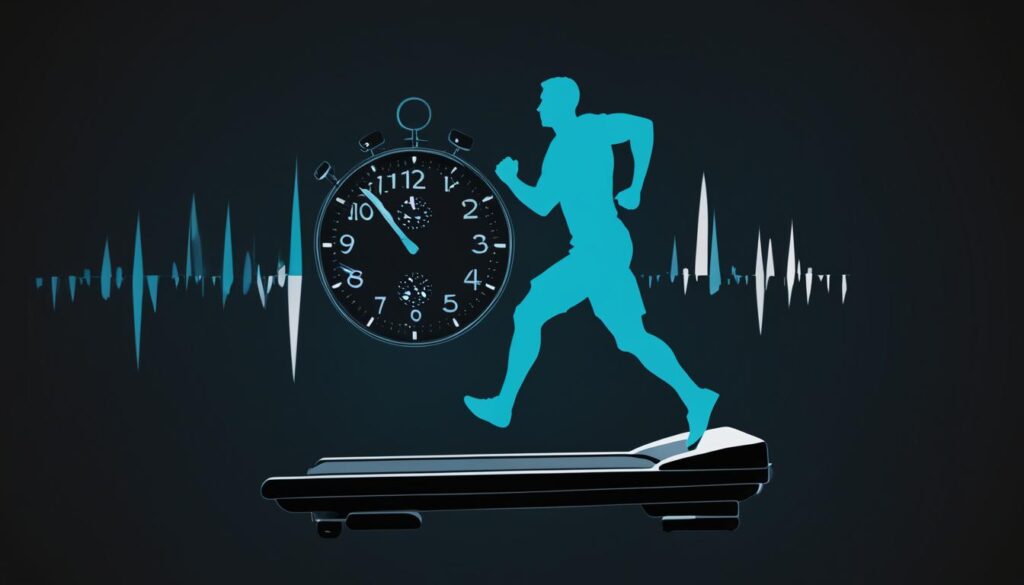Working the night shift can present unique challenges when it comes to weight loss. Disrupted sleep patterns and imbalanced hormones can make it harder to burn fat and maintain a healthy lifestyle. However, with the right strategies and exercises, night shift workers can still achieve their weight loss goals.
It’s important to choose workouts that maximize calorie burn and target fat loss. Incorporating a combination of cardiovascular exercises and strength training can help boost metabolism and build lean muscle mass. Additionally, focusing on exercises that improve overall fitness and endurance will contribute to long-term weight maintenance.
To optimize fat burning during workouts, consider implementing high-intensity interval training (HIIT). This involves alternating between short bursts of intense activity and periods of rest. HIIT workouts have been shown to increase fat burning and improve overall cardiovascular fitness in a shorter amount of time.
Another effective workout option for night shift workers is strength training. Building lean muscle mass can elevate your resting metabolic rate, making it easier to burn calories throughout the day. Incorporate exercises that target multiple muscle groups, such as squats, lunges, push-ups, and deadlifts.
Additionally, don’t forget to include flexibility and mobility exercises in your routine. Stretching and yoga can help improve posture, relieve muscle tension, and prevent injuries.
Remember, consistency is key when it comes to seeing results. Aim for at least three to four workouts per week, and find a schedule that works best for your sleep and work routine.
Key Takeaways:
- Choosing workouts that maximize calorie burn and target fat loss is essential for night shift workers.
- Incorporate high-intensity interval training (HIIT) to optimize fat burning and boost cardiovascular fitness.
- Include strength training exercises to build lean muscle mass and increase the resting metabolic rate.
- Don’t forget to include flexibility and mobility exercises to improve posture and prevent injuries.
- Consistency is key; aim for at least three to four workouts per week.
How Does Working the Night Shift Affect Your Weight?
Working the night shift can have a significant impact on your weight due to various factors. The disrupted circadian rhythm caused by working during nighttime hours can lead to imbalanced hormones, which in turn increase your appetite for high-calorie foods. This can result in unhealthy and excessive eating, leading to weight gain.
Your body’s resting metabolic rate, which is responsible for the calories burned at rest, may also decrease when working the night shift. This means that your body is not efficiently burning calories, making it easier to gain weight.
“Working the night shift disrupts your body’s circadian rhythm, leading to imbalanced hormones that increase appetite for high-calorie foods.”
Furthermore, studies have shown that weight gain from working the night shift tends to accumulate in the abdominal area, resulting in a higher risk of developing visceral fat. Visceral fat is associated with various health problems, including cardiovascular diseases and insulin resistance.
In addition to these direct effects on weight, working the night shift can also have negative impacts on mental health, gastrointestinal function, and insulin resistance. Sleep deprivation, which is common among night shift workers, can contribute to increased stress levels and mood disorders, leading to emotional eating and further weight gain.
“It can also decrease your resting metabolic rate and promote weight gain, especially in the abdominal area. Furthermore, it can have negative effects on mental health, gastrointestinal function, and insulin resistance.”
The disruption of the body’s natural circadian rhythm can also affect the digestive system, leading to gastrointestinal issues such as acid reflux and irregular bowel movements. Additionally, altered insulin sensitivity due to irregular eating patterns can increase the risk of developing insulin resistance, which can further contribute to weight gain and metabolic disorders.
In summary, working the night shift can have detrimental effects on your weight and overall health. Understanding these impacts is crucial in developing strategies to mitigate their effects and prioritize your well-being.
Tips for Losing Weight as a Night Shift Worker
To successfully lose weight while working the night shift, it is essential to implement effective strategies tailored to your unique circumstances. Here are some tips to help you achieve your weight loss goals:
1. Create a Log to Track your Food Intake
Keeping a log of your food intake can provide valuable insight into your eating habits and help you identify areas for improvement. By tracking calories and portion sizes, you can create a calorie deficit and make mindful choices that support weight loss.
2. Start with Protein
Beginning your shift with a high-protein meal can provide sustained energy and help control appetite throughout the night. Include lean sources of protein such as chicken, fish, tofu, or Greek yogurt in your meals to promote satiety and support muscle recovery.
3. Prepare Healthy Meals in Advance
Planning and preparing healthy meals ahead of time can be a game-changer for night shift workers. This allows you to avoid relying on unhealthy fast food or vending machine snacks. Opt for nutritious options such as salads, stir-fries, or grain bowls packed with vegetables, lean proteins, and whole grains.
4. Get Enough Vitamin D
As night shift workers often miss out on sunlight exposure, it’s crucial to ensure you’re getting enough vitamin D. This important nutrient plays a role in various body functions, including bone health and immune system support. Consider taking a vitamin D supplement and/or spending time outdoors during your breaks.
5. Make Time for Exercise
Regular exercise is vital for weight loss and overall health. Find time in your schedule to incorporate physical activity, whether it’s a brisk walk, a workout at the gym, or a home workout routine. Aim for at least 150 minutes of moderate-intensity exercise or 75 minutes of vigorous activity per week.
6. Stay Hydrated
Proper hydration is often overlooked but plays a significant role in weight loss. Drinking enough water can promote satiety, enhance metabolism, and support overall health. Keep a water bottle with you during your shift and aim to drink at least 8 cups (64 ounces) of water per day.
7. Establish a Sleep Routine
Despite working unconventional hours, establishing a consistent sleep routine is crucial for maintaining a healthy weight. Create a sleep-friendly environment by keeping your bedroom dark, cool, and quiet. Set aside specific times for sleep and try to stick to them as closely as possible, even on your days off.
By implementing these strategies, you can overcome the challenges of night shift work and achieve successful weight loss. Remember to consult with a healthcare professional before making any significant dietary or lifestyle changes.
Tips for Improving Sleep Quality and Quantity

Adequate sleep is essential for weight management. Getting enough quality sleep can help regulate hormones, control appetite, and support overall well-being. If you’re a night shift worker struggling with sleep, here are some tips to improve your sleep quality and quantity:
1. Control Your Sleep Environment
Creating a sleep-conducive environment is crucial for improving sleep. Consider the following:
- Ensure your bedroom is dark and free from sources of light that may disrupt your sleep.
- Use blackout curtains or eye masks to block out any external light.
- Lower the temperature in your bedroom to a cooler level, as a cooler environment promotes better sleep.
- Block out noise by using earplugs or a white noise machine, especially if you live in a noisy area.
2. Establish a Consistent Sleep Routine
Creating a regular sleep routine can help signal your body that it’s time to sleep. Consider the following:
- Go to bed and wake up at the same time every day, even on your days off.
- Avoid napping during the day, as it can disrupt your sleep-wake cycle.
- Develop a calming bedtime routine, such as taking a warm bath or reading a book.
3. Avoid Sleep-Disrupting Foods and Drinks
Some foods and drinks can interfere with your sleep. Consider the following:
- Avoid consuming caffeine close to bedtime, as it can stimulate your nervous system and make it harder to fall asleep.
- Limit your intake of high-sugar foods and drinks, as they can cause energy crashes and disrupt your sleep.
- Avoid heavy meals or spicy foods close to bedtime, as they can cause indigestion and discomfort.
4. Practice Relaxation Techniques
“Sleep is the best meditation.” – Dalai Lama
Engaging in relaxation techniques before bedtime can help calm your mind and prepare your body for sleep. Consider the following:
- Try deep breathing exercises or progressive muscle relaxation to relax your body and reduce stress.
- Practice meditation or mindfulness to quiet your mind and promote a sense of inner peace.
- Consider incorporating yoga or stretching into your bedtime routine to release tension.
Remember, improving sleep quality takes time and consistency. By implementing these tips and prioritizing your sleep, you can enhance your overall well-being and support your weight management goals.
Best Foods to Eat Before Bed
Choosing the right foods before bed can play a significant role in promoting better sleep and aiding in weight loss for night shift workers. It’s essential to opt for options that provide a mix of complex carbs, fiber, protein, and sleep-regulating compounds. Here are some nutritious and delicious bedtime snacks that can help enhance your sleep quality:
- Warmed oats with blueberries and Greek yogurt: This combination is not only warm and comforting but also provides a good balance of carbs, fiber, and protein to keep you satisfied and promote relaxation.
- Sprouted bread with almond butter: Sprouted bread is a healthier alternative to regular bread, while almond butter adds a dose of healthy fats and protein.
- Apples and almonds: Apples offer fiber and natural sugars, while almonds provide healthy fats and protein. This combo makes for a satisfying and nutritious bedtime snack.
- Kiwis: Kiwis are known to contain sleep-promoting compounds, such as serotonin and antioxidants. Enjoying one or two kiwis before bed can help improve sleep quality.
- Whole-grain cereal with milk and fruit: Opt for a whole-grain cereal that is low in sugar and pair it with milk and your favorite fruits for a balanced and filling bedtime snack.
- Cottage cheese: Cottage cheese is a great source of casein protein, which is known for its slow digestion and sustained release of amino acids that can promote muscle recovery and enhance sleep.
- Rooibos tea: Rooibos tea is a caffeine-free herbal tea that contains antioxidants and can help relax the body and prepare it for sleep.
- Montmorency tart cherry juice: Montmorency tart cherry juice is rich in melatonin, a hormone that regulates sleep-wake cycles. Drinking a small glass of it before bed may help improve sleep duration and quality.
By incorporating these bedtime snacks into your nighttime routine, you can promote better sleep and support your weight loss goals as a night shift worker.
“Sleep is the golden chain that ties health and our bodies together.” – Thomas Dekker
The Best Diet for Night Shift Workers

While there isn’t a specific diet designed solely for night shift workers, there are certain diet tips that can help support weight loss and overall health. Emphasizing whole, minimally processed foods is key to providing your body with essential nutrients and promoting satiety.
“By prioritizing whole foods, such as fruits, vegetables, lean proteins, and healthy fats, you can fuel your body with the nutrients it needs to thrive.”
When planning your meals as a night shift worker, it’s important to establish a regular eating schedule, similar to those who work during the day. This can help regulate your circadian rhythms and support a healthy metabolism. Avoid skipping meals or eating sporadically throughout your shift, as it can disrupt your body’s natural balance.
Let’s take a look at some diet tips specifically tailored for night shift workers:
-
Start your shift with a nutritious meal that includes a balance of protein, fiber, and healthy fats. This can provide sustained energy and keep you satisfied throughout the night. For example, a breakfast wrap filled with scrambled eggs, avocado, and spinach can be a delicious and nourishing option.
-
Plan and prepare your meals ahead of time. This can help you make healthier choices and avoid relying on processed or high-calorie convenience foods. Consider batch cooking on your days off or using meal prep services that offer wholesome, pre-portioned meals.
-
Stay hydrated by drinking plenty of water throughout your shift. Dehydration can make you feel tired and sluggish, so be sure to keep a water bottle handy at all times.
-
Incorporate a variety of fruits and vegetables into your diet. They are packed with essential vitamins, minerals, and antioxidants that support overall health. Snack on carrot sticks, apple slices, or baby spinach leaves during your breaks.
-
Limit your intake of processed foods, sugary drinks, and unhealthy snacks. Instead, opt for whole, nutrient-dense alternatives. For instance, swap out chips for air-popped popcorn or choose plain Greek yogurt with fresh berries instead of sugary yogurt cups.
-
Be mindful of portion sizes and listen to your body’s hunger and fullness cues. It’s easy to overeat when you’re tired or stressed, so take your time to enjoy your meals and stop eating when you feel satisfied.
Remember, consistency is key when it comes to maintaining a healthy diet as a night shift worker. By prioritizing whole, minimally processed foods and establishing a regular eating schedule, you can take care of your body and support your weight loss goals even while working unconventional hours.
Essential Tips for Night Shift Workers

As a night shift worker, it is crucial to prioritize various aspects of your health to maintain overall well-being. In addition to focusing on weight loss strategies, here are some essential tips to consider:
Prioritizing Sleep
Getting enough sleep is vital for your physical and mental well-being. Create a sleep-friendly environment that promotes relaxation and rest. Keep your bedroom dark, quiet, and at a comfortable temperature. Establish a consistent sleep routine, even on your days off, to regulate your body’s internal clock.
Packing Nutrient-Dense Snacks
When working the night shift, it’s important to fuel your body with nutrient-dense snacks to maintain energy levels. Opt for snacks that are high in protein, fiber, and healthy fats, such as nuts, Greek yogurt, fruits, and vegetables. Avoid relying on sugary or processed snacks that can lead to energy crashes and weight gain.
Prioritizing Exercise
Regular physical activity is crucial for managing weight and improving overall health. Find time to incorporate exercise into your daily routine, even if it means breaking it up into shorter sessions. Aim for a combination of cardiovascular exercises, strength training, and flexibility exercises to maximize the benefits.
Avoiding Excessive Caffeine and Sugary Drinks
While it may be tempting to rely on caffeine and sugary drinks to stay awake during your shift, they can disrupt your sleep and contribute to weight gain. Limit your intake of these beverages and opt for healthier alternatives such as herbal teas, infused water, or unsweetened beverages.
Setting Up a Regular Meal Schedule
Establish a consistent meal schedule that aligns with your night shift hours. Eating regular meals can help stabilize your energy levels and regulate your metabolism. Plan your meals ahead of time and focus on incorporating a balanced mix of protein, carbohydrates, and healthy fats.
Getting Enough Vitamin D
Night shift workers often face a deficiency in vitamin D due to limited sunlight exposure. Consider taking a vitamin D supplement or include foods rich in vitamin D, such as fatty fish, fortified dairy products, and eggs, in your diet to support bone health and overall well-being.
Prepping Meals
Preparation is key when it comes to maintaining a healthy diet as a night shift worker. Take time to pre-plan and prepare your meals in advance. This will help you avoid relying on unhealthy takeout or convenience foods during your shift.
Avoiding Alcohol Before Bed
While alcohol may initially help you fall asleep, it can disrupt your sleep patterns and lead to poor sleep quality. It’s best to avoid consuming alcohol in the hours leading up to your bedtime to ensure a restful night’s sleep.
Monitoring Calorie Intake
Being aware of your calorie intake is essential for maintaining a healthy weight. Keep track of your daily food consumption and ensure that you are consuming an appropriate number of calories for your goals. Consider using a food diary or a calorie tracking app to help you stay on track.
Nutrient-Dense Snack Ideas
| Snack | Nutritional Benefits |
|---|---|
| Nuts and seeds (almonds, walnuts, pumpkin seeds) | Provide healthy fats, protein, and fiber for sustained energy |
| Greek yogurt with berries | High in protein and antioxidants |
| Fresh fruits (apples, oranges, berries) | Rich in vitamins, minerals, and fiber |
| Vegetable sticks (carrots, celery) with hummus | Low in calories and high in fiber and essential nutrients |
| Hard-boiled eggs | Excellent source of protein and essential vitamins |
By incorporating these essential tips into your night shift routine, you can promote better sleep, maintain energy levels, and support your weight loss goals. Remember to prioritize sleep, pack nutrient-dense snacks, prioritize exercise, avoid excessive caffeine and sugary drinks, set up a regular meal schedule, get enough vitamin D, prep meals, avoid alcohol before bed, and monitor your calorie intake to maximize your overall health and well-being as a night shift worker.
Strategies for Adjusting to Night Shift Work

Adjusting to night shift work requires specific strategies to help the body adapt to a different sleep schedule. Here are some effective techniques to improve sleep quality and promote better overall well-being:
- Wearing sunglasses after the shift: Wearing sunglasses after your night shift can help regulate melatonin levels, signaling to your body that it’s time for restful sleep.
- Creating sleep triggers: Establishing a consistent bedtime routine can be a powerful sleep trigger. Engaging in relaxing activities before bed, such as reading a book or practicing deep breathing exercises, can signal to your body that it’s time to unwind and prepare for sleep.
- Eating a carb-heavy meal before bed: Consuming a meal that is rich in carbohydrates before bedtime can promote better sleep. Carbs increase the production of serotonin, a neurotransmitter that helps regulate sleep.
- Keeping a sleep diary: Keeping track of your sleep patterns and habits in a sleep diary can provide valuable insights into improving your sleep quality. Note down factors such as sleep duration, sleep environment, and any potential disruptions.
- Taking a hot bath or shower: A relaxing hot bath or shower before bed can help relax tense muscles and create a soothing environment for sleep.
- Lowering bedroom temperature: Maintaining a cooler temperature in your bedroom can promote better sleep. Aim for a temperature between 60-67°F (15-19°C) for optimal sleep conditions.
- Relaxing the mind: Practicing relaxation techniques such as meditation or guided imagery before bed can help calm the mind and promote restful sleep.
- Doing crunches before bed: Engaging in light physical activity, such as doing crunches, can help release endorphins and relax the body, making it easier to fall asleep.
By incorporating these strategies into your night shift routine, you can gradually adjust to the demands of shift work and optimize your sleep quality for improved overall well-being.
Tips for Daytime Wake-Up Routine
After a long night shift, it’s crucial to establish a healthy wake-up routine to kick-start your day and optimize your overall well-being. Incorporating key practices upon waking up can help you feel refreshed, energized, and ready to take on the day ahead. Here are some tips to help you create a revitalizing daytime routine:
Hydrating Upon Waking Up
One of the first things you should do upon waking up is to hydrate your body. Drinking a glass of water can help replenish the fluids lost during sleep and jumpstart your metabolism. Staying hydrated throughout the day is essential for maintaining overall health and supporting weight loss efforts.
Getting Exposure to Natural Light
Exposing yourself to natural light in the morning can have a positive impact on your circadian rhythms, which regulate your sleep-wake cycle. Natural light helps signal to your body that it’s time to be alert and awake, boosting your energy levels and improving your mood. Spend some time outdoors or open your curtains to let the sunlight in while you prepare for your day.
Fitting in Cardio Exercise
Incorporating cardio exercise into your wake-up routine is not only beneficial for your overall health but can also aid in weight loss. Engaging in activities such as brisk walking, jogging, cycling, or swimming can help burn fat, boost your metabolism, and increase your energy levels. Aim for at least 30 minutes of moderate-intensity cardio exercise to reap the full benefits.
By hydrating upon waking up, getting exposure to natural light, and fitting in cardio exercise, you can optimize your daytime wake-up routine and set yourself up for a productive and energized day.
| Benefits of a Daytime Wake-Up Routine | Hydrating Upon Waking Up | Getting Exposure to Natural Light | Fitting in Cardio Exercise |
|---|---|---|---|
| Replenishes fluids lost during sleep | Regulates circadian rhythms | Increases energy levels | Burns fat and aids in weight loss |
| Kickstarts metabolism | Boosts mood and improves mental clarity | Enhances vitamin D production | Improves cardiovascular health |
| Optimizes overall well-being | Supports weight loss efforts | Reduces symptoms of seasonal affective disorder (SAD) | Increases stamina and endurance |
Can Night Shift Workers Benefit from Quick Fat-Burning Exercises?
Night shift workers can definitely benefit from quick fatburning exercises beginners. These types of exercises are perfect for fitting in a workout during non-traditional hours. Even just a short burst of activity can help boost metabolism and burn off some extra calories, making a big difference over time.
Planning Meals and Cutting Calories

As a night shift worker, planning and preparing meals ahead of time is essential for maintaining a healthy diet and avoiding the temptation of unhealthy food options. By taking the time to plan your meals and snacks in advance, you can ensure that you have nutritious options readily available and cut unnecessary calories from your diet.
One effective strategy for meal planning is to utilize freezer meal recipes. These recipes allow you to prepare large batches of meals and store them in the freezer for later use. Not only does this save you time during busy workdays, but it also helps you avoid relying on fast food or takeout meals.
Below is an example of a freezer meal recipe that is both delicious and low in calories:
Freezer Meal Recipe: Chicken and Vegetable Stir-Fry
- Ingredients:
- 2 boneless, skinless chicken breasts, sliced
- 2 cups of mixed vegetables (such as bell peppers, broccoli, and snap peas)
- 2 cloves of garlic, minced
- 2 tablespoons of low-sodium soy sauce
- 1 tablespoon of sesame oil
- 1 teaspoon of cornstarch
- 1/4 cup of water
- Instructions:
- In a large pan, heat the sesame oil over medium heat.
- Add the chicken and cook until browned.
- Add the garlic and mixed vegetables, and cook until the vegetables are tender.
- In a small bowl, whisk together the soy sauce, cornstarch, and water.
- Pour the sauce over the chicken and vegetables, and stir until everything is well coated.
- Cook for an additional 2-3 minutes, or until the sauce thickens.
- Allow the stir-fry to cool before dividing it into individual meal-sized portions.
- Place each portion in a freezer-safe container or bag, and store in the freezer.
This freezer meal recipe is packed with protein and vegetables, making it a well-balanced and satisfying option for your night shift meals. By preparing meals like this in advance, you can easily control your calorie intake and ensure that you’re fueling your body with nutritious ingredients.
In addition to freezer meals, it’s important to focus on cutting calories from your overall diet. This can be achieved by making conscious choices such as reducing portion sizes, opting for lower-calorie ingredients, and limiting added sugars and fats. Keeping a food diary or using a calorie-tracking app can also help you monitor and manage your daily calorie intake.
With proper meal planning and cutting calories, you can support your weight loss goals and maintain a healthy lifestyle as a night shift worker.
The Challenges of Night Shift Work on Weight Loss

Night shift work can have a significant impact on weight loss due to its effects on metabolism, calorie burning during sleep, and disruption of circadian rhythms. These challenges can make it more difficult for night shift workers to achieve their weight loss goals.
During night shifts, the body’s natural metabolic processes are disrupted, leading to a slower metabolic rate. This means that night shift workers may burn fewer calories compared to those who work during the day. The body’s ability to efficiently burn calories during sleep is also reduced, further contributing to weight gain.
In addition to metabolic changes, night shift work disrupts the body’s circadian rhythms, which are the internal clocks that regulate various physiological processes, including metabolism. When these rhythms are disrupted, the body can experience hormonal imbalances that increase appetite and promote weight gain, particularly in the abdominal area.
To overcome these challenges and achieve weight loss success, night shift workers can implement targeted strategies. Prioritizing healthy eating habits during the night shift, such as consuming nutrient-dense foods and avoiding high-calorie snacks, can help maintain a calorie deficit. Regular exercise, even during non-traditional hours, can boost metabolism and support weight loss efforts.
“Working night shifts can disrupt your body’s internal clock and metabolism, making weight loss more challenging.”
Establishing a consistent sleep routine, even during the day, can help regulate circadian rhythms and improve the quality of sleep. Adequate sleep is essential for weight management as it allows the body to recover and regenerate, optimizing overall health and well-being.
Despite the challenges, it is possible for night shift workers to achieve their weight loss goals with determination and the right strategies tailored to their unique circumstances. By understanding the impact of night shift work on metabolism, calorie burning during sleep, and circadian rhythms, individuals can make informed choices to support their weight loss journey.
Conclusion
Losing weight and maintaining a healthy lifestyle as a night shift worker requires a combination of strategies focused on nutrition, exercise, sleep, and overall self-care. By prioritizing sleep, making mindful food choices, staying active, and creating a consistent routine, night shift workers can successfully manage their weight and improve their overall well-being. With dedication and perseverance, it is possible to achieve weight loss goals while working unconventional hours.
To start, prioritizing sleep is essential for both weight loss and overall health. Night shift workers should aim for a consistent sleep schedule and create a sleep-friendly environment, such as a dark and quiet room with a comfortable temperature. Adequate sleep not only aids in weight management but also helps regulate hormones, boost metabolism, and enhance cognitive function.
In addition to sleep, nutrition plays a vital role in weight loss for night shift workers. Making mindful food choices is key. Opt for whole, minimally processed foods, and aim for a balance of macronutrients, including lean proteins, complex carbohydrates, and healthy fats. Planning and preparing meals ahead of time can help avoid relying on unhealthy options during busy shifts. Packing nutrient-dense snacks and staying hydrated throughout the shift can also help curb cravings and maintain energy levels.
Alongside sleep and nutrition, staying active is crucial for weight loss and overall well-being. Incorporating regular exercise into the day, even if it’s before or after a night shift, can help burn calories, improve cardiovascular health, and boost mood. Find activities that you enjoy and make them a priority in your routine. To reap the benefits, consistency is key.




